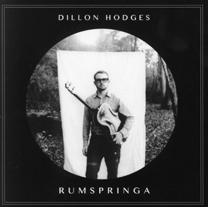The Graham Weekly Album Review #1733

Click on CD Cover for Audio Review in streaming mp3 format | |
by George Graham
(independent release As broadcast on WVIA-FM 7/10/2013)

Click on CD Cover for Audio Review in streaming mp3 format | |
(independent release As broadcast on WVIA-FM 7/10/2013)
The popularity and critical recognition of Gillian Welch, with her original music that sounds very old, has inspired a bunch of emerging performers to follow in her artistic footsteps -- both solo performers and bands -- to create their own music that evokes early 20th century folksongs, either through the writing style or the instrumentation. We recently featured such a recording in this album review series by Putnam Smith. Our album this week is another good example. It's the debut full-length CD by Dillon Hodges called Rumspringa.
Twenty-two-year old Dillon Hodges grew up in Florence, Alabama, near the famous Muscle Shoals studio. He says he was surrounded by bluegrass music for most of his life. Starting at age 11, throughout his teens, he played weekly at a place called the Fiddler's Cafe in Tuscumbia, Alabama, which he said helped him to develop a stage presence and overcome his early shyness and reluctance to get up before audiences. He graduated from the University of Northern Alabama in 2012, with a double major of accounting and entertainment management. To pursue a musical career, he moved to Nashville, where he currently lives with his wife.
The bluegrass and traditional folk elements have definitely found their way into Hodges' music, but he's not as much oriented toward evoking old sounds as Ms. Welch. Instead, there is a somewhat eclectic blend of more a contemporary singer-songwriter quality, plus some atmospheric elements and one can even hear some Nick Drake influence with, for example, a small string section. Lyrically, some of the songs also have the quality of old traditional folk ballads, including death and other tragedies.
The result is a memorable recording that features high quality material that does an effective job of blending diverse styles, while Hodges' vocals are airy and pleasing. Hodges is a multi-instrumentalist playing guitar, banjo, and mandocello. The other key player on the CD is James Gregory, who produced the album, and is heard on bass and keyboards. Other personnel varies by track, with the production and arrangements being particularly tasteful.
The album's title, Rumspringa comes from the Pennsylvania Dutch, and refers to the period when an adolescent is allowed to get out into the world before deciding whether to adopt the Amish ways.
The succinct 10-track album begins with a song called Hills of Tennessee which lyrically, has a kind of traditional quality, with the words about a death. <<>> Later on, the song picks up musical momentum with a nice bluegrass-flavored section. <<>>
Nightmare is a kind of impressionistic love song that is a nice blend of the atmospheric and slightly more pop-oriented. <<>>
The Night My Heart Disappeared is a more direct, though lyrically clever love song. It also evokes more traditional music in its arrangement. <<>>
A string section is an important part on the title piece Rumspringa. Though the title is not mentioned in the lyrics, the song makes reference to the conflict inherent in the Amish custom of letting teenagers experiment in the larger world. <<>>
With the traditional style lyrics of a murder ballad is the original song Bullet for a Broken Heart, which has all the appropriate ingredients with a love triangle and the protagonist killing his rival, who happens to be a judge, and then he becomes a fugitive. <<>>
Also about crime and punishment is The Proof, which is a nice blend of traditional style lyrics and a more rock-oriented musical backing. <<>>
Songs about traveling or rambling have been the grist for folksingers' mills for decades. Dillon Hodges' contribution to the literature is a track called, not surprisingly, Movin' On. It has an properly tasteful folk-style backing. <<>>
The CD ends with Take These Hands, performed solo with an antique banjo. The metaphysical lyrics and traditional-sounding melody makes this one of the most memorable tracks on the CD. <<>>
Dillon Hodges new release Rumspringa is an impressive debut album from a young but musically experienced artist. His years of growing up playing bluegrass in Alabama help to provide the underpinning to the music on his album, which like an increasing number of young artists, draws on traditional earlier folk music for inspiration, both musically and lyrically. But Hodges is not completely wedded to the traditionalist revival mold, but also absorbs influences from bluegrass, rock and other sophisticated singer-songwriter fare. The songs are well-written, the performances are musically interesting but sensitive to the songs.
Our grade for sound quality is close to an "A." There was admirable restraint on using studio effects, and there was, blessedly, no effort to simulate old-fashioned low-fi recordings as so many young artists are doing on their CD. The dynamic range, how well the recording maintains the difference between loud and soft passages, is decent, but not at an audiophile level.
There is no shortage of good singer-songwriter records out now, and it's nice to hear young artists turn to older influences and reinvent them for their own. On his first time out, Dillon Hodges has already distinguished himself in this well-populated field.
(c) Copyright 2013 George D. Graham. All rights reserved.
This review may not be copied to another Web site without written permission.
 To Index of Album Reviews | To George Graham's Home Page. | What's New on This Site.
To Index of Album Reviews | To George Graham's Home Page. | What's New on This Site.